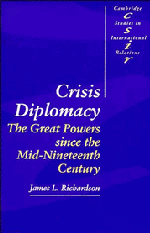Book contents
- Frontmatter
- Contents
- List of tables
- Acknowledgments
- I PART I
- PART II
- 4 The Eastern crisis, 1839–1841
- 5 The Crimean war crisis, 1853–1854
- 6 The Russo-Japanese crisis, 1903–1904
- 7 The Sudeten crisis, 1938
- 8 The Franco-Prussian and Agadir crises
- 9 Pearl Harbor and the Berlin crises
- PART III
- PART IV
- Notes
- Select bibliography
- Index
- CAMBRIDGE STUDIES IN INTERNATIONAL RELATIONS
9 - Pearl Harbor and the Berlin crises
Published online by Cambridge University Press: 03 May 2011
- Frontmatter
- Contents
- List of tables
- Acknowledgments
- I PART I
- PART II
- 4 The Eastern crisis, 1839–1841
- 5 The Crimean war crisis, 1853–1854
- 6 The Russo-Japanese crisis, 1903–1904
- 7 The Sudeten crisis, 1938
- 8 The Franco-Prussian and Agadir crises
- 9 Pearl Harbor and the Berlin crises
- PART III
- PART IV
- Notes
- Select bibliography
- Index
- CAMBRIDGE STUDIES IN INTERNATIONAL RELATIONS
Summary
The United States was the principal actor in the final three cases included in the study: the US-Japan crisis in 1940–41, the Berlin blockade and the protracted Berlin crisis between 1958 and 1962. The cases offer three ‘snapshots’ in which it is possible to discern something of the evolution of the American conduct of foreign policy, but this is incidental to the present themes. Only the first of the three can be reconstructed from the perspective of both key actors. The paucity of Soviet sources limits the extent to which the Berlin cases can be used for comparative analysis, but they are important in illustrating the effects of nuclear weapons on crisis diplomacy.
The US–Japan crisis, 1940–1941
That the outcome of this protracted crisis would be war appeared increasingly probable to decision makers on both sides during 1941. Although it was played down by some of them in 1940, the risk of war was already evident during most of that year, but there was no clear starting point, no sudden precipitant of the crisis. Arguably, however, the repercussions of Germany's invasion of France, Belgium and the Netherlands in May 1940 were such as to intensify the conflict between the United States and Japan to the level of crisis: Japan was emboldened to consider steps which could lead to war, even though both sides hoped to avoid it. Each sought to deter the other, but most of their moves proved counter-productive, enhancing rather than reducing the perceived likelihood of war.
- Type
- Chapter
- Information
- Crisis DiplomacyThe Great Powers since the Mid-Nineteenth Century, pp. 181 - 216Publisher: Cambridge University PressPrint publication year: 1994



